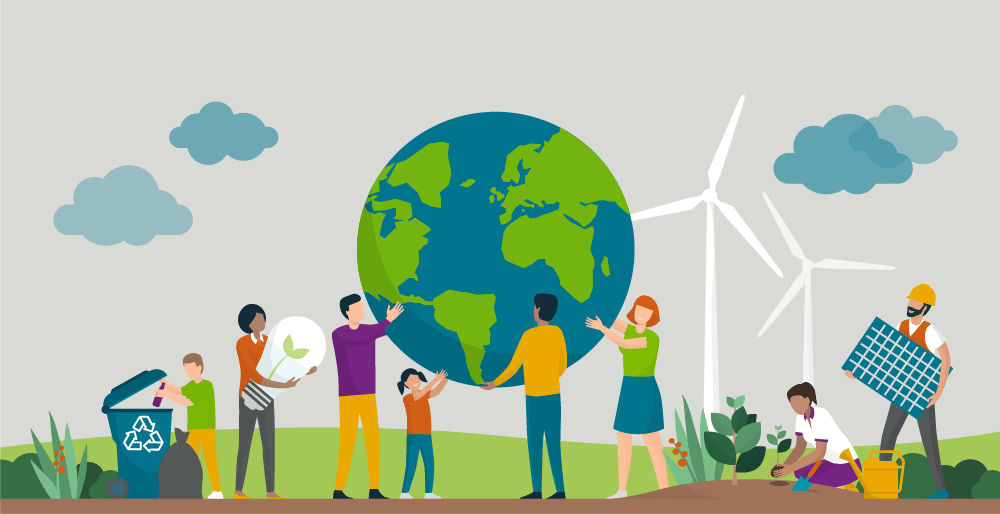What do you think of when you hear the term environmental protection? Preventing negative changes to our air, land or sea? Do you think of the health and well-being of humans, animals, plants and trees?
The general goal is absolutely to conserve these resources and enrich the way of life for all species. But environmental protection is far more complex when it comes to curbing pollution, protecting endangered species and changing major societal behavior patterns.
As an individual wanting to help, it can be overwhelming to think about those factors. So let’s start with the basics of environmental protection and then take a look at some of our Charity Alliance members who are prioritizing this critical issue across their programs. Then we have three ways you can help protect the environment today!
Q: Why is environmental protection important?
A: Global temperatures are rising at rates higher than ever before. Production and consumption are increasingly releasing harmful gases into the atmosphere, creating a shift in weather patterns and triggering erratic events that upend communities and livelihoods (AKA climate change). Our partner Oxfam America has a 30-second breakdown on what this means for people around the world:
Q: What is being done to mitigate the effects of climate change?
A: Over the next 10 years, climate change has the potential to push 132 million more people into poverty. Our Charity Alliance members are taking the climate crisis seriously, knowing that it most greatly impacts the people and communities they serve. Here are a few examples of what that looks like – although keep in mind that these are nowhere near all encompassing!
LISTENING / LEARNING
Unitarian Universalist Service Committee is working with partners to gain a better understanding of how their communities are being impacted by the effects of climate change.

PROTECTING / RESTORING / EDUCATING
Mote Marine Laboratory & Aquarium is focusing its environmental efforts on our oceans by conducting research, protecting sea life and educating all ages to be stewards of the sea.

MOBILIZING / ADVOCATING
Oxfam America is emphasizing the imbalanced effect of the climate crisis on those in poverty and calling for change.

Q: Ok, now I know there is work being done to reverse the impact of climate change and prevent further damage, but what about the people who are being pushed further into poverty because of climate change? Are there any solutions in place *right now* to help people who are directly impacted?
A: Yes! Our Charity Alliance members have programs that focus on:
- Stepping in when natural disasters strike – and helping communities prepare for and mitigate the effects of weather events.
- Taking action to protect indigenous lands.
- Working with local officials to report and stop illegal activities (logging, fishing, hunting, etc. in restricted areas).
- And so much more!
Another charity focus area intertwined with environmental protection is agriculture. In this space, poverty and the environment intersect in a very complex way. Agriculture and farming practices can contribute to climate change; they are also hindered by the changing climate. The adverse effects of droughts and flooding negatively impact crop yields and nutritional value, which feeds into a separate topic of food insecurity. (I told you it’s complex!) To help farmers adapt to these changing conditions, our charity partners are equipping communities with different techniques and deploying some really innovative solutions.
Mercy Corps is partnering with NASA to deploy digital innovations that will help revolutionize the way small-scale farmers feed the world.
ECHO is helping communities around the world who are being forced to adapt to ever-changing weather patterns, giving them the tools to become more resilient in adverse conditions. Trainers from ECHO share techniques for farmers to improve the harvests on their degraded fields, including how to make liquid fertilizer and fill planting stations with compost.

Q: What can I do to help protect our environment from climate change?
A: We can all take small steps to change our daily consumption patterns – reduce single-use plastics, repurpose or upcycle used materials, compost food scraps and biodegradable waste, decrease the amount of meat we eat, etc.
But there are other ways to make an impact too! Get started today to protect our planet for tomorrow.
- Give
- Support these organizations with a recurring donation through your workplace giving program. Check to see if your company has a match and multiply your impact!
- Volunteer
- ECHO: Provide hope and hunger solutions by mission by giving your time through multiple in-person or remote options where needed skills range from the off handyperson task to graphic design.
- Mote Marine Laboratory & Aquarium: Join the more than 1,000 volunteers who commit their time for long-term in-person support, including summer programs for high schoolers and sea turtle patrol.
- Advocate
- Mercy Corps: Send a letter to Congress asking for funding to help with climate adaptation techniques and assistance.
- Oxfam America: Sign your name to call on the Biden administration to take action against the climate crisis.
- Unitarian Universalist Service Committee: Call on your congressional representatives to endorse a five-step plan to address climate migration.


